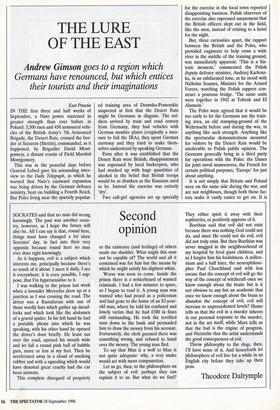Second opinion
SOCRATES said that no man did wrong knowingly. The past was another coun- try, however, as I hope the future will also be. All I can say is that, round here, things must have changed a lot since Socrates' day, in fact into their very opposite because round here no man ever does right knowingly.
As it happens, evil is a subject which interests me, principally because there's so much of it about. I meet it daily, I see it everywhere: it is even possible, I sup- pose, that I'm hypersensitive to it.
I was walking to the prison last week when a lavender Mercedes drew up at a junction as I was crossing the road. The driver was a Rastafarian with one of those woolly hats which gather up dread- locks and which look like the abdomen of a gravid spider. In his left hand he had a portable phone into which he was speaking, with his other hand he opened the driver's door briefly. He leant out over the road, opened his mouth wide and let fall a round pink ball of bubble gum, more or less at my feet. Then he accelerated away in a cloud of smoking rubber and with a squealing which would have denoted great cruelty had the car been animate.
This complete disregard of propriety or the existence (and feelings) of others made me shudder. What might this man not be capable of? The world and all it contained was for him but the means by which he might satisfy his slightest whim.
Worse was soon to come. Inside the prison there is a noticeboard of wanted criminals. I had a few minutes to spare, so I began to read it. A young man was wanted who had posed as a policeman and had gone to the home of an 82-year- old man, where he told his confused and lonely victim that he had £500 in fines still outstanding. He took the terrified man down to the bank and persuaded him to draw the money from his account. Fortunately, the clerk guessed there was something wrong, and refused to hand over the money. The young man fled.
To say that Man is a wolf to Man is not quite adequate: why, a very snake would act with more compunction.
Let us go, then, to the philosophers on the subject of evil: perhaps they can explain it to us. But what do we find?
They either spirit it away with their sophistries, or positively approve of it. Boethius said that evil did not exist because there was nothing God could not do, and since He could not do evil, evil did not truly exist. But then Boethius was never mugged in the neighbourhood of my hospital by feral giant children, and so I forgive him his foolishness. A millen- nium and a half later, the neurophiloso- pher Paul Churchland said with less excuse that the concept of evil will go the way of the concept of witchcraft once we know enough about the brain: but is it not obvious to any but an academic that once we know enough about the brain to abandon the concept of evil, evil will increase to unprecedented levels? Hume tells us that the evil in a murder inheres in our personal response to the murder, not in the act itself, while Marx tells us that the bad is the engine of progress, and Nietzsche that the artist understands the good consequences of evil.
Throw philosophy to the dogs, then, I'll have none of it. And henceforth let philosophers of evil live for a while in an English city before they take up their pens.
Theodore Dalrymple


















































































 Previous page
Previous page